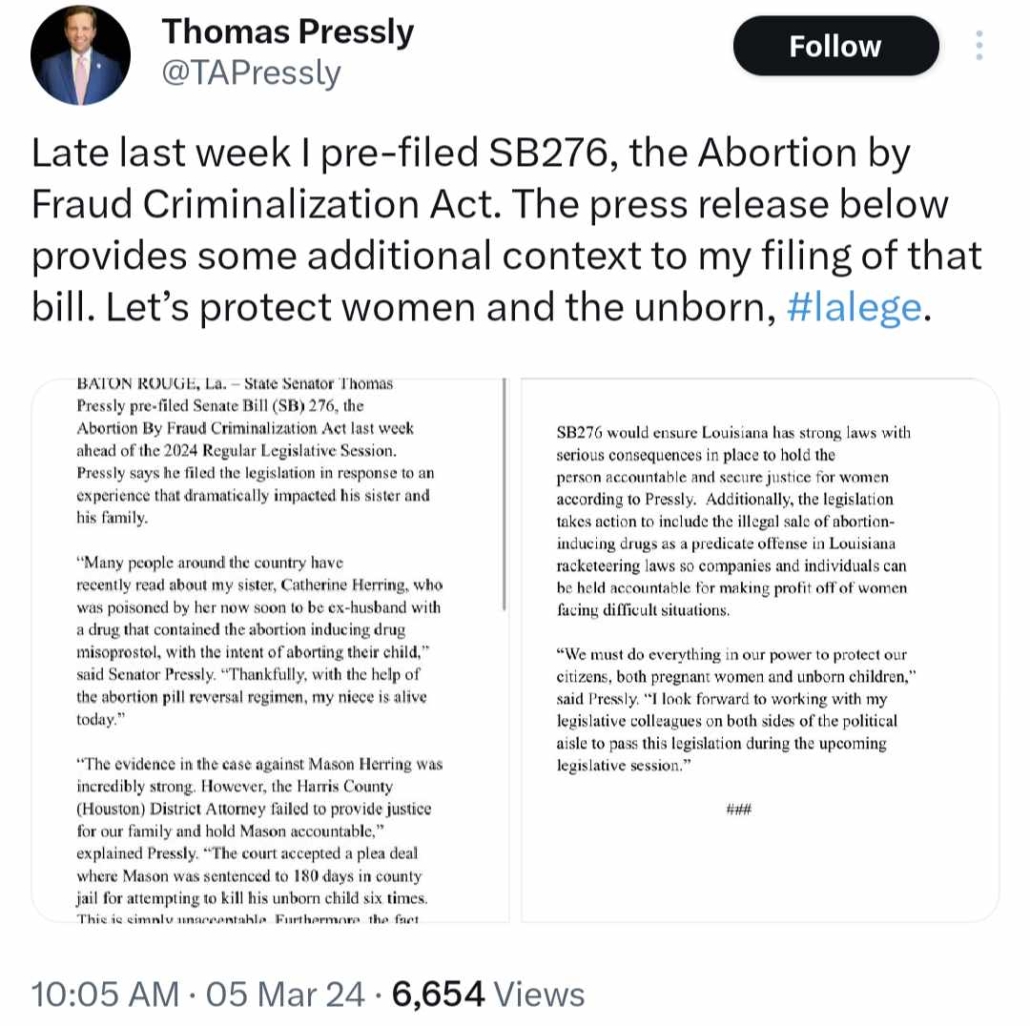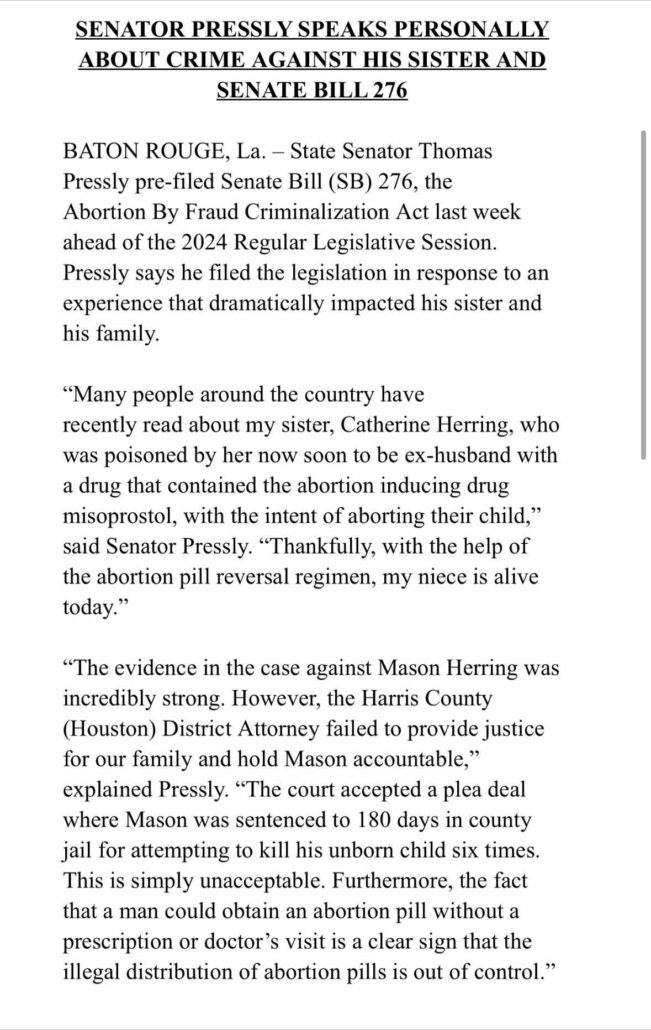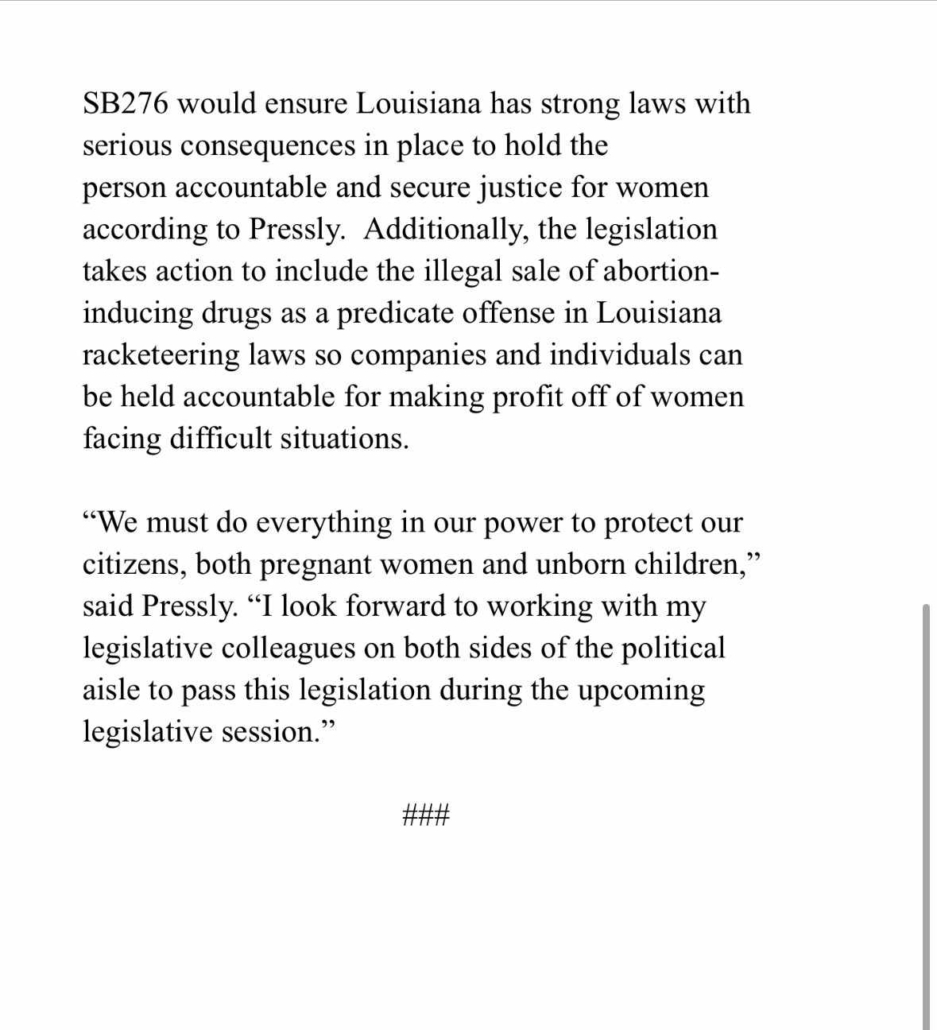Summary: The Abortion By Fraud Criminalization Act
[Today’s post is written by a practicing attorney, submitted anonymously.]
In February a story broke out of Texas in which a man, Mason Herring, surreptitiously dosed his then-wife, Catherine Herring, numerous times with misoprostol. Luckily, Catherine’s daughter survived and is still alive today.
For his part, Mason was charged by the State of Texas with injury of a child, assault to induce abortion, and assault of a pregnant person. But, pursuant to a recent plea deal, the Harris County DA dismissed the abortion-related charge and Mason pled guilty to injury of a child and assault of a pregnant person. For those crimes, Mason faces only 180 days in jail and 10 years on probation.
As it turns out, Catherine Herring is the sister of Louisiana State Senator Thomas Pressly. In response to Texas’ lack of justice for his sister and niece, Pressly aims to prevent similar failures in Louisiana with his proposed SB 276, the Abortion By Fraud Criminalization Act. Here is his tweet and press release:



SB 276 entails three legal changes:
1. It adds a new section to the state’s revised statutes that criminalizes “coerced abortion by means of fraud[.]” This means that, if passed, someone who “knowingly and intentionally engages in the use or attempted use of an abortion-inducing drug on a pregnant woman, without her knowledge or consent, to cause an abortion,” could face up to ten years in prison and fines up to $75,000.
While it is already illegal in Louisiana for anyone to “deliver[], dispens[e], distribut[e], or provid[e] a pregnant woman with an abortion-inducing drug” in order to “knowingly cause an abortion to occur,” RS 14:87.9(A), this proposed law would specifically criminalize the act of covertly inducing (or attempting to induce) a woman to ingest an abortion-inducing drug without her knowledge or consent.
The penalties increase substantially if the fetus “is more than three months of gestational age and, therefore, substantially increases the pregnant woman’s risk of death or serious bodily harm due to the nonconsensual use of an abortion-inducing drug on the pregnant woman[.]” After three months of gestation, anyone who uses or attempts to fraudulently induce an abortion using abortion-inducing drugs could face up to twenty years in prison and fines up to $100,000.
This section also prohibits anyone charged under this law from using their prosecution as a “defense against the prosecution under any other provision of law,” for example when “the use of an abortion-inducing drug results in the death or serious bodily injury of the pregnant woman” and the defendant is charged with murder.
2. SB 276 alters three already-existing section of Louisiana law—the sections entitled Abortion, Late Term Abortion, and Criminal Abortion by Means of Abortion-Inducing Drugs—to criminalize attempted abortion. For example, as RS 14:87.7(A) on abortion reads now, it is “unlawful for a physician or other person to perform an abortion, with or without the consent of the pregnant female.” But, if SB 276 were to pass as it is written currently, RS 14:87.7(A) would instead provide that it is “unlawful for a physician or other person to perform or attempt to perform an abortion, with or without the consent of the pregnant female.”
3. RS 14:87.9 (Criminal Abortion by Means of Abortion-Inducing Drug) is an already existing section prohibiting anyone from “caus[ing] an abortion to occur by means of delivering, dispensing, distributing, or providing a pregnant woman with an abortion-inducing drug.” SB 276 adds this section to the list of predicate acts that can constitute racketeering activity under RS 15:1352(A). This means that, under SB 276, any “enterprise” (as defined by RS 15:1352(B)) which “engag[es] in at least two incidents of” criminal abortion by means of abortion-inducing drugs could face additional liability under the Louisiana Racketeering Act.
*Featured image photo credit, Towfiqu barbhuiya, Unsplash.



